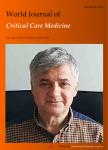Molecular targeting therapy using bevacizumab for peritoneal metastasis from gastric cancer
Molecular targeting therapy using bevacizumab for peritoneal metastasis from gastric cancer作者机构:Department of Surgery Kurume University School of Medicine Kurume Fukuoka 830-0011 Japan
出 版 物:《World Journal of Critical Care Medicine》 (世界重症医学杂志)
年 卷 期:2013年第2卷第4期
页 面:48-55页
学科分类:1002[医学-临床医学] 100214[医学-肿瘤学] 10[医学]
主 题:Gastric cancer Peritoneal metastasis Vascular endothelial growth factor MKN-45P Bevacizumab
摘 要:AIM: To clarify the significance of vascular endothelial growth factor(VEGF) in peritoneal metastasis from gastric cancer, using the gastric cancer cell line MKN-45 compared with the high potential peritoneal dissemination gastric cancer cell line MKN-45 P. METHODS: The supernatant of culture medium of MKN-45 cells or MKN-45 P cells was collected and the concentrations were measured of various cytokines, matrix metalloproteinases, growth factor and angiogenic factors, including VEGF. We performed an initial pilot study to explore whether bevacizumab, a humanized monoclonal antibody against VEGF, had any suppressive effect on the peritoneal dissemination from gastric cancer in an experimental nude mouse modelof peritoneal metastasis. RESULTS: The concentrations of interleukin-6(IL-6), IL-8, VEGF and matrix metalloproteinase-2 protein in the culture supernatant were each significantly higher than each of those for MKN-45. In the in vivo study, the volume of ascites and the mitotic index were significantly lower in the therapy group than in the nontherapy group. The survival curve of the therapy group was significantly higher than that of the non-therapy group. These results suggested that VEGF was correlated with peritoneal metastasis from gastric cancer. CONCLUSION: Findings suggested that bevacizumab for inhibiting VEGF could suppress peritoneal dissemination from gastric cancer.



